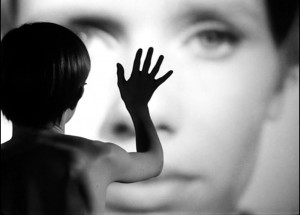In Persona, written and directed by Ingmar Bergman in 1966, a sharp rebuke is offered to films, such as Birdman, that try to create a world that shuts out reality, to, in effect, take undue comfort in solipsism. A doctor tells Elisabet Vogler, who has voluntarily stopped verbally communicating, “Reality is diabolical. Your hiding place isn’t watertight. Life trickles in from the outside, and you’re forced to react.”
Whereas Birdman cranks up the melodrama in the delivery of its message (which the Academy certainly got), Persona examines how melodrama contains political meanings. The crisis in Persona is presented front and center. Elisabet struggles with being the mother of a young son while continuing her acting career in the theater. One night, during her performance in the ancient Greek play Electra, she finds its depiction of matricide absurd, which nearly causes her to burst out laughing. Instead, she falls silent for a moment.
Afterwards, she refuses to speak at all. Eliabet meets with a doctor, an older woman. The doctor thinks Elisabet, who looks perfectly healthy, is acting a role—of willfully being silent. She advises Elisabet, “You should go on with this part until it is played out, until it loses interest for you.” But is the doctor correct? Or does Elisbet no longer know what role to play? Can she even act like herself?
These questions set up the arrival of the nurse, Sister Alma, assigned to care for Elisabet during her recovery at the doctor’s seaside summer home. Alma makes the insightful point that she is concerned because Elisabet’s refusal to speak indicates a tremendous inner strength. Alma otherwise appears rather clueless, suggesting that it is easier to observe others, but harder to look at oneself.
 Although Elisabet does not talk, she, of course, communicates in other ways. She appears to be a sympathetic listener as Alma, inebriated one night, breaks down and confesses to her about having had an abortion. Therefore Elisabet and Alma in different ways illustrate the social expectations placed on women to accept traditional gender roles.
Although Elisabet does not talk, she, of course, communicates in other ways. She appears to be a sympathetic listener as Alma, inebriated one night, breaks down and confesses to her about having had an abortion. Therefore Elisabet and Alma in different ways illustrate the social expectations placed on women to accept traditional gender roles.
Elisabet, however, also (willingly?) gives herself away by sending Alma off with an unsealed letter to the doctor that compels her to read it: she discovers that Elisabet has been coldly studying her. Alma cannot believe her betrayal, which goes sharply against the idea that actors are supposed to be inherently sympathetic. She confronts Elisabet, hoping for an apology. Elisabet responds by running away.
Alma breaks down; she sputters, finally saying, “I won’t!” (the opposite of “I will!”). She has learned from Elisabet the power of refusal, of stepping out of a social role—and leaving behind the accompanying cycle of guilt, confession, and forgiveness.
 The rest of the film is a dream vision, perhaps created by Alma. This sequence is set up by the film’s opening, giving us a brief history of film interspersed with images that resonate with a psychic intensity (a spider, a hand being nailed to a cross). We are reminded that film is dream work: the difference between past and present is that film has become far better at hiding its illusions. Persona points out that revealing these illusions makes film all the more hypnotic. Like the image of the young boy (Elisabet’s son, perhaps) touching a screen on which is projected a woman’s face, film seduces us only to betray us.
The rest of the film is a dream vision, perhaps created by Alma. This sequence is set up by the film’s opening, giving us a brief history of film interspersed with images that resonate with a psychic intensity (a spider, a hand being nailed to a cross). We are reminded that film is dream work: the difference between past and present is that film has become far better at hiding its illusions. Persona points out that revealing these illusions makes film all the more hypnotic. Like the image of the young boy (Elisabet’s son, perhaps) touching a screen on which is projected a woman’s face, film seduces us only to betray us.
Fittingly, Elisabet, in this prolonged, surreal sequence, says one word: “nothing.” She appears as a psychic vampire, using her inner strength to overcome Alma’s will. At the same time, both women are becoming each other—playing out the theme in Persona that each woman is a mask for the other: we see a composite image of Elisabet and Alma’s face. As Bergman recalls, this uncanny image shocked Liv Ullmann and Bibi Andersson, who played Elisabet and Alma, respectively, when they first saw it.
Here the political undercurrent swells. Both women have been damaged, bent out of shape by the social roles they are expected to play. They have been reduced to masks that cover their guilt, their insecurity. To shift to the idea that the world is a stage, our collective consciousness has likewise been traumatized by historical guilt—the Holocaust (Elisabet looks at a photo of the liberation of a concentration camp)—and continues being pressured by Vietnam (the footage of a monk immolating himself to protest the war is shown twice). Not merely inserted for shock effect, these images comment on the historical fantasy of being able to be excused for one’s actions.
In a running time of under 90 minutes, the film has very little to offer in responding to the provocative question it raises (voiced by the doctor): how is playing no role still playing a role? And we have to ask, what role is Alma playing? To be sure, her perspective shifts significantly. At first, she is the naïve spokesperson for the power of art to help mend damaged souls. Faced with Elisabet’s self-determination, she dreams of being Elisabet, a famous actor, who can shift in and out of roles, escalating her own fear of being trapped. At the end of the film, she says, “No! I’m not like you. I don’t feel like you. I’m Sister Alma—I’m just here to help you. I’m not Elisabet Vogler. You are Elisabet Vogler.”
We watch Alma leave the summer home by bus. Before her departure, we see in the frame Bergman directing a camera movement. The final image is of a darkened film projector after the film has run off the sprocket.
Yes, Persona comments on itself as film. But it also suggests that being seen, for an actor, fuels an unhealthy sense of vanity. Why else would Elisabet want to try to take Alma over? Because, of course, she can.
There is thus added significance in Alma’s accusing Elisabet of being “rotten.” To deal with overwhelming guilt at individual and social levels, we have given performers the license to act out our worst impulses, such as murder. This is what the ancient Greeks called catharsis, to have our moral failings expiated on stage. Yet such privilege, Bergman warns us, can be abused—this explains, at a fundamental level, the power struggle between Elisabet and Alma.
Bergman would further caution us that the traditional function of the theater, to provide catharsis, has its limits. Faced with the almost unimaginable horrors of the Holocaust and Vietnam, what can art do? Persona veers in the direction of the avant-garde in addressing the issue of visual representation, such as the opening montage and the simulated breaking and burning up of the film at the midpoint of the narrative. At the same time, it is understandable to conclude, given the film’s logic, that Elisabet may have the correct response: to say nothing. Then again, is it just another excuse for not acting to prevent future atrocities? If the film is at times brutally honest about what actors do, it also sheds a critical light on the role of the audience.


